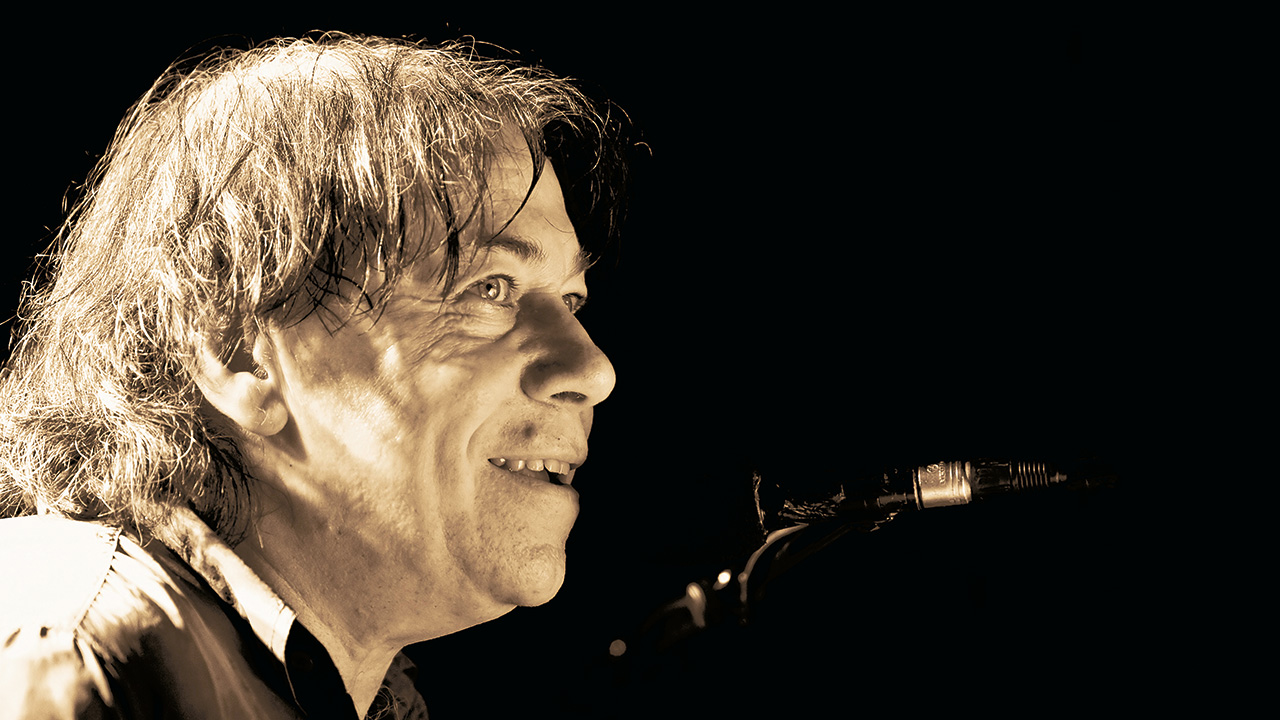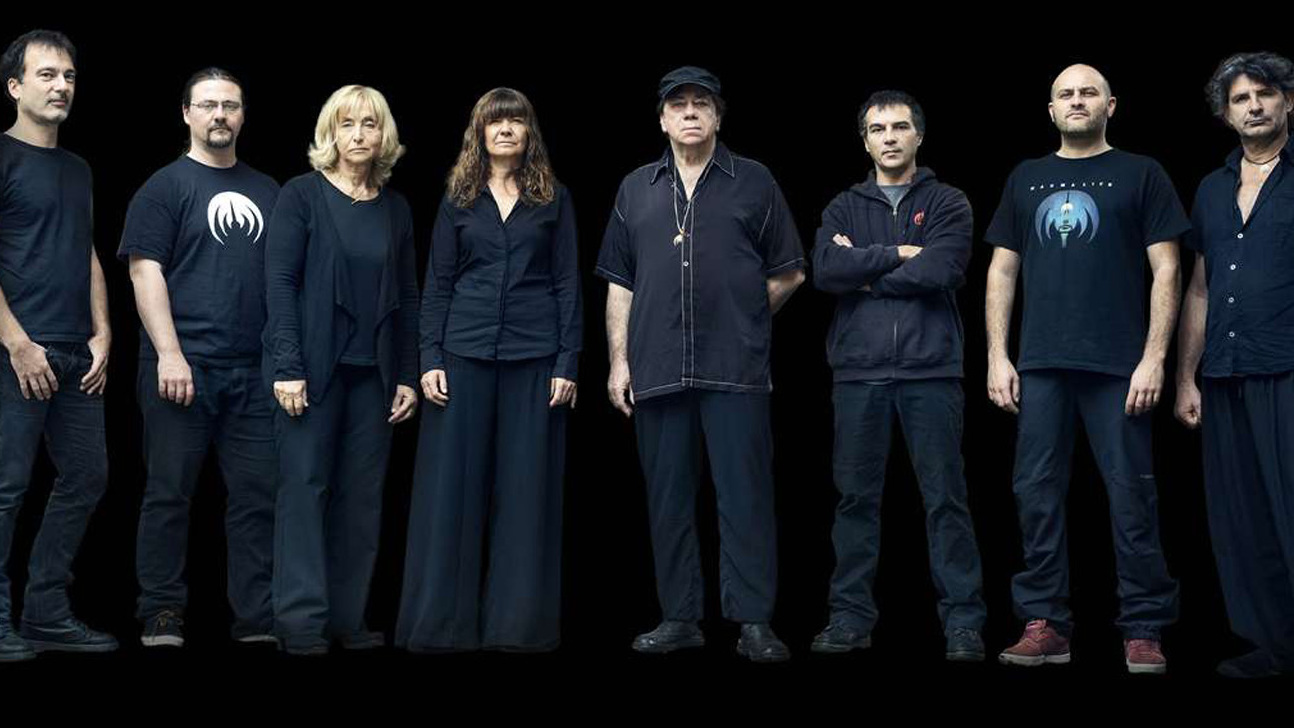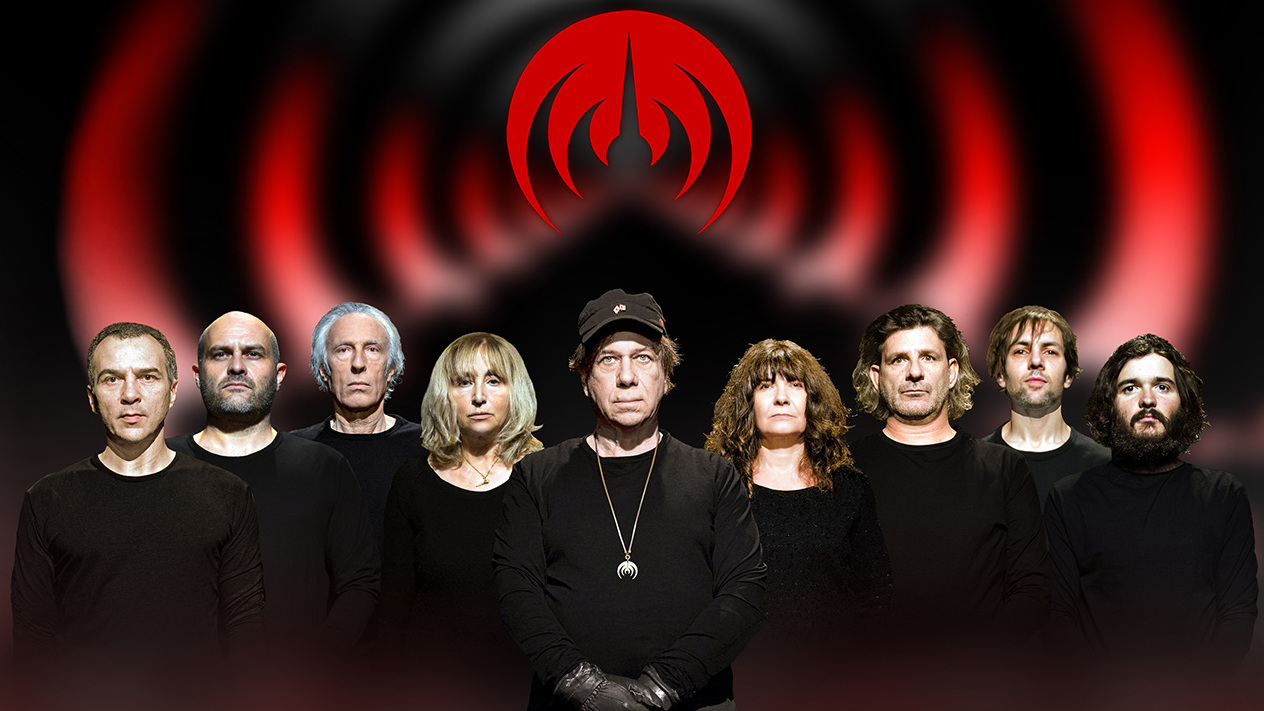In August 2012, the then most recent incarnation of Magma performed at the Zappanale festival in Germany. They included venerable pieces such as Rïah Sahïltaahk from 1971’s 1001° Centigrades and Attahk from 1978’s album of the same name, while their latest album release, Félicité Thösz, was performed in its entirety. Reflecting on the show, Magma vocalist Stella Vander says, “It was great. The only thing was it started to rain incredibly just as we went on stage.”
Of course, such inclement weather wouldn’t be capable of dampening the spirits of the band or the audience, who drummer and Magma founder Christian Vander judges to have been “open, knowledgeable and very attentive”. As if to add living proof to Christian’s assessment in the after-show afterglow, Stella recalls an encounter with a fan. “He had travelled all the way from Siberia to see us. He was a young drummer. The first time he listened to Magma, he told us, it had changed his life.”

Magma have been altering people’s perceptions of what a rock band could and should be doing since the release of their 1970 debut album. An unlikely source of creative sustenance for Christian throughout his career has been the work of the American tenor sax player John Coltrane.
“It’s the energy that attracts me,” Christian explains. “The fury of playing, construction, the ‘sound’, the long-term vision that inspired me. For me, his music is an inexhaustible source, a force that conquers all. There is something else in his music that goes beyond. If John’s music was only music, it might have worn me out. He certainly opened the door to a world we did not know. It’s probably this unbridled spiritual quest that led him there. For these reasons, I listen to John regularly. He accompanies me in every period of my life – I always hear his music differently, I rediscover him every time and it always fascinates me. For me, his last studio recording before he died in 1967, Expression, is the deepest record; it rips you apart, almost as if John was already addressing us from another world. It’s ‘in-between worlds’ music.”
Christian’s acknowledgement of a music that exists ‘in-between worlds’ seems especially applicable to a band that’s as richly and as fiercely diverse as Magma. A convergence of acerbic riffing, stark tonalities, abrasive textures and a glowering, propulsive energy set the band firmly beyond the mainstream right from the off. Christian has described Magma’s sound as multi-directional. Not content to plough one furrow, no musical style seems immune from the gravitational field they generate – jazz, rock, folk, gospel and operatic grandiosity have all been drawn into a mix that remains defiantly ambitious.
Add to this already eclectic confluence of musical information a tightly woven mythos underpinning each album, whose backstory involves alien travellers from the planet Kobaïa, and whose lyrics are couched almost entirely in the guttural, chant-like language of Kobaïan, and Magma’s cult outsider status was never in doubt.

Looking back, the decision by the A&M label to release the 1973 classic Mëkanïk Dëstruktïw Kömmandöh can be taken as either brilliantly visionary or the act of a major record company that had no idea what they were signing up at the time. One suspects that there were elements of both.
“Being with A&M meant our records were distributed worldwide. That era was important for Magma, in terms of notoriety,” says Christian. “There were no disadvantages that I could think of. Nobody ever imposed anything on us, whether it be in regards to the choice or even the length of the pieces.”
For his then-wife Stella, who had up to that point been doing lights, and managing the band’s business affairs for a while, the release of Mëkanïk Dëstruktïw Kömmandöh marked her first appearance as a performing member of the group. “When Christian wrote MDK he was looking for female singers and there were casting sessions at our home where the singers would come and audition,” she says. “The biggest problem for many of these hopeful singers was in terms of rhythm – the girls could sing okay but they couldn’t get the phrasing right.
“One day Christian was working and I was in the next room singing along. Of course, I could sing it all because I knew the music by heart. Christian heard and then came and said I should sing for the band.”

When a group’s been in existence for over 40 years, there’s bound to be something of a turnover in members. In Magma’s case, there are some estimates that place that figure to be well over a 100, including luminaries such as bass player Jannick Top and violinist Didier Lockwood. Is one reason for so many personnel changes because Vander is difficult to work with? “No, not at all,” laughs Stella.
“In the early days there were a lot of gigs but very little money so people would get tired. They had family commitments and so on. Then there are others who come into the band but decide that they have to do their own thing, and that’s good of course. Our last keyboard player, Bruno Ruder, told us that after Félicité Thösz he was going to quit, but we had a few months until the next gig and so he introduced us to our new pianist, Jérémie Ternoy.”
Though containing many of the signature motifs associated with Magma, Félicité Thösz surprised some observers with its more conventional tempos and moments which veer into territories that have more in common with feelgood pop than the more sepulchral or eerie cosmic regions where Magma’s sound usually resides.
As Christian explains, the 28-minute suite had been around for a long time before it was formally recorded. “I started working on this composition in 2001, right after finishing the exhausting recording of Les Cygnes Et Les Corbeaux. With Félicité, there was an immediate feeling of ease – the piece seemed to come to life, clear, under my fingers. There lies the colour of Magma’s great themes, and its quintessential spirit. One could say that the melodies have evolved, gained fluidity. This theme offers a new aspect of Magma’s music.”
It’s not just a few disgruntled fans who were surprised by Christian’s compositional direction. “I wanted to play it on stage for years but our then keyboard player, Emmanuel Borghi, kept on saying that Félicité was not Magma,” reveals Stella. “Christian and myself really didn’t understand why he would think that because for us, it was really part of our sound. We didn’t want him to leave the band so we compromised and didn’t do it. After he left and Bruno Ruder joined, we asked everyone if it would be okay to do this piece. Thankfully they all thought Félicité was really Magma and so we were able to include it in our set.”
It seems that it’s one track in particular, Tëha, that makes some long-term listeners do a double-take. Bursting with an effusive sparkle, Stella Vander’s vocal is joyous, beatific and buoyed aloft by sunny harmonies, chiming piano and an irresistibly catchy backbeat. “Christian is a real fan of Tamla Motown stuff from the 60s and it’s a kind of homage or tribute to those sounds. Unfortunately, some of our older fans don’t like it,” Stella notes with an air of genuine puzzlement, bordering on disappointment. “I don’t understand why they say this kind of thing because it’s really nice. They say it’s too much like easy listening. Yes, it’s happy, uplifting music, but we have the right to be happy sometimes, no?”

At the Zappanale festival and other gigs, Stella has observed an increasing number of young people in the crowd, a fact that encourages them greatly. “If the people following us were all our age, we’d be really disappointed and maybe we might not go on. Sometimes it’s the parents who’ve played Magma albums as their children were growing up. But sometimes they just discover us themselves and that’s really nice.”
With a back catalogue and a career as lengthy as Magma’s, it’s perhaps inevitable that some factions within their fanbase gather around favourite eras or recordings and hold these as the point in space and time where the ‘true’ spirit of the group resides. Some would have you believe that if it doesn’t sound like MDK then it’s not the real deal.
“It might have to do with how long we’ve been around!” says Christian. “I’ve always maintained the same direction in our work, without concessions, without giving in to any of the trends we found along the way. Music has to be able to bear interpretation. If it lies in just a sound then it’s doomed.”
“As an artist, you have to write for yourself, not for your audience” agrees Stella wholeheartedly. “That’s what Christian always did. If you write only to please your fans, then as an artist you can never evolve.”
This article first appeared in issue 30 of Prog Magazine.

